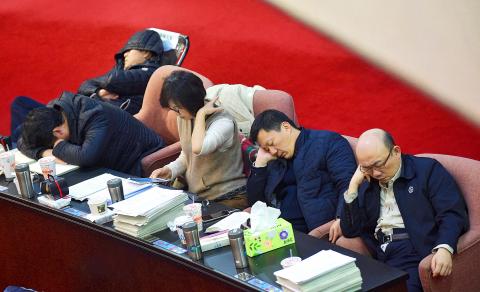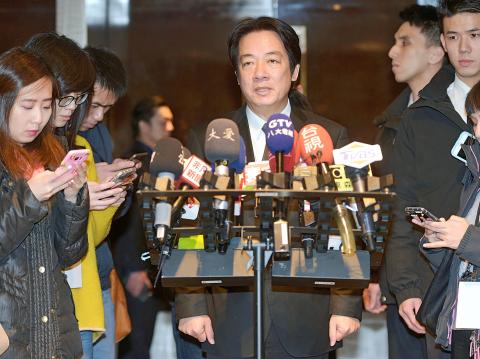Controversial amendments to the Labor Standards Act (勞動基準法) yesterday cleared the legislature, with President Tsai Ing-wen (蔡英文) apologizing for the inconvenience caused by her administration’s two revisions of the act within a year.
Under the amended act, overtime pay is to remain at least 1.33 times a worker’s normal hourly wage for the first two hours and at least 1.66 times from the third hour onward on weekdays.
The rates are to remain at 2.33 and 2.66 times a worker’s normal rates if they are asked to work on their weekly “flexible” day off.

Photo: Liu Hsin-de, Taipei Times
However, workers would no longer be paid overtime in blocks of four hours, but by the actual number of hours they work.
Employers are allowed to raise the monthly overtime cap from 46 to 54 hours after gaining the consent of unions or their employees during employer-staff meetings and notifying the local labor authorities, with the proviso that employees must not be allowed to work more than 138 hours in three months.
Employees would also have the option of converting their overtime into compensatory leave, but if they are unable to use the compensatory in an agreed period of time or before their contract expires, their employer would be required to convert it back into an overtime payment.

Photo: Chang Chia-ming, Taipei Times
The amended act stipulates that employees can roll unused annual leave over to the next year and that employers should convert remaining annual leave days into wages at the end of the second year.
Employers would be allowed to move an employee’s fixed weekly day off within a period of 14 days with the prerequisite that they have gained the approval of unions or employees.
Sectors wishing to adopt the measure would need to pass a review by the local authority and be designated by the Ministry of Labor as a sector that qualifies.
The aforementioned provisos also apply to an amendment that allows employers in approved sectors to shorten the rest time between shifts from 11 to eight hours.
The amendments are to take effect on March 1.
Following the bill being passed at 8:44am, Tsai issued a formal apology to the public for the social unrest caused by the second amendment to the act in a year.
While Premier William Lai (賴清德) has already apologized, Tsai said she felt she owed the public an apology as the head of her administration.
Tsai also thanked police for their hard work due to the protests the amendment provoked.
The controversy surrounding the bill, while causing some turmoil, nonetheless shows that Taiwan is a society willing to accommodate a plurality of opinions, she said.
The act would benefit employers and employees alike, and offer a substantial foundation for industrial transition, she said.
Chinese Nationalist Party (KMT) legislators apologized to workers nationwide over their failure to block the bill.
“We would like to apologize to more than 9 million workers nationwide. Despite our greatest efforts, we were unable to stop the Labor Standards Act from being sabotaged,” KMT caucus secretary-general Lin Wei-chou (林為洲) said.
“We could only do so much, but we truly hope that we can return to power in this year’s local elections and achieve what the central government could not,” KMT Legislator Chen Yi-ming said.

DAREDEVIL: Honnold said it had always been a dream of his to climb Taipei 101, while a Netflix producer said the skyscraper was ‘a real icon of this country’ US climber Alex Honnold yesterday took on Taiwan’s tallest building, becoming the first person to scale Taipei 101 without a rope, harness or safety net. Hundreds of spectators gathered at the base of the 101-story skyscraper to watch Honnold, 40, embark on his daredevil feat, which was also broadcast live on Netflix. Dressed in a red T-shirt and yellow custom-made climbing shoes, Honnold swiftly moved up the southeast face of the glass and steel building. At one point, he stepped onto a platform midway up to wave down at fans and onlookers who were taking photos. People watching from inside

A Vietnamese migrant worker yesterday won NT$12 million (US$379,627) on a Lunar New Year scratch card in Kaohsiung as part of Taiwan Lottery Co’s (台灣彩券) “NT$12 Million Grand Fortune” (1200萬大吉利) game. The man was the first top-prize winner of the new game launched on Jan. 6 to mark the Lunar New Year. Three Vietnamese migrant workers visited a Taiwan Lottery shop on Xinyue Street in Kaohsiung’s Gangshan District (崗山), a store representative said. The player bought multiple tickets and, after winning nothing, held the final lottery ticket in one hand and rubbed the store’s statue of the Maitreya Buddha’s belly with the other,

‘NATO-PLUS’: ‘Our strategic partners in the Indo-Pacific are facing increasing aggression by the Chinese Communist Party,’ US Representative Rob Wittman said The US House of Representatives on Monday released its version of the Consolidated Appropriations Act, which includes US$1.15 billion to support security cooperation with Taiwan. The omnibus act, covering US$1.2 trillion of spending, allocates US$1 billion for the Taiwan Security Cooperation Initiative, as well as US$150 million for the replacement of defense articles and reimbursement of defense services provided to Taiwan. The fund allocations were based on the US National Defense Authorization Act for fiscal 2026 that was passed by the US Congress last month and authorized up to US$1 billion to the US Defense Security Cooperation Agency in support of the

‘COMMITTED TO DETERRENCE’: Washington would stand by its allies, but it can only help as much as countries help themselves, Raymond Greene said The US is committed to deterrence in the first island chain, but it should not bear the burden alone, as “freedom is not free,” American Institute in Taiwan Director Raymond Greene said in a speech at the Institute for National Defense and Security Research’s “Strengthening Resilience: Defense as the Engine of Development” seminar in Taipei yesterday. In the speech, titled “Investing Together and a Secure and Prosperous Future,” Greene highlighted the contributions of US President Donald Trump’s administration to Taiwan’s defense efforts, including the establishment of supply chains for drones and autonomous systems, offers of security assistance and the expansion of